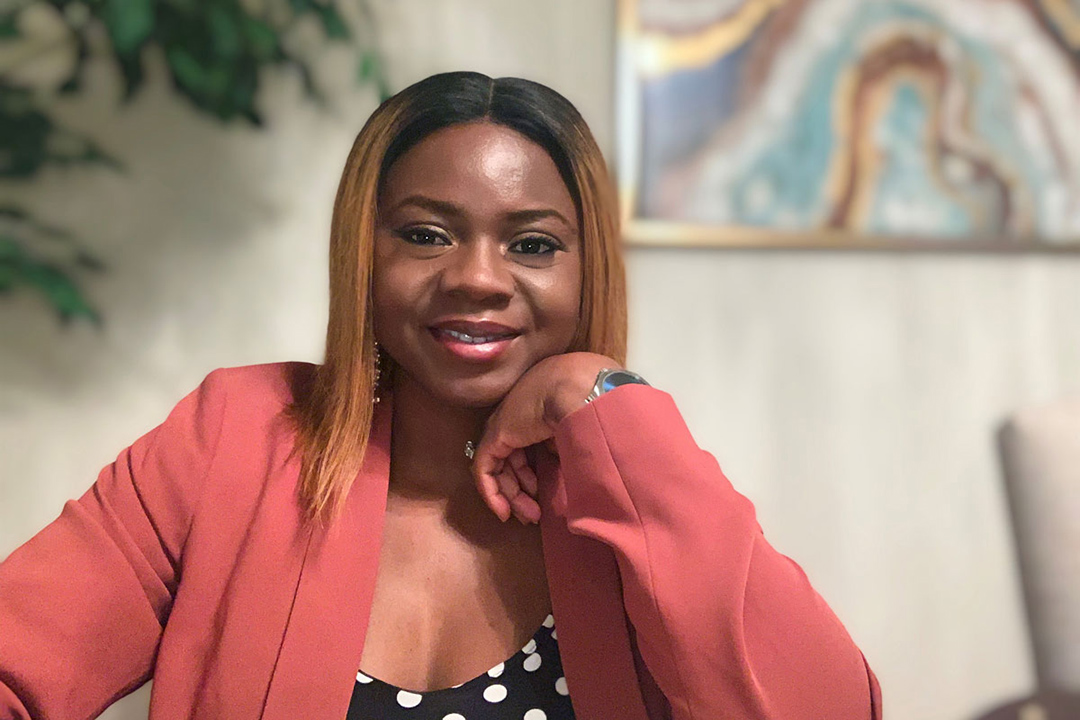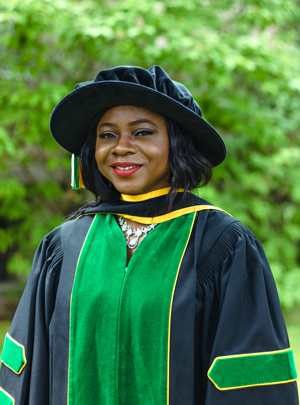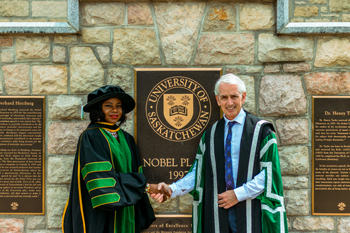
Paying it forward
Even as a child, Dr. Adeola Olubamiji (PhD’17) saw her future in physics. Now she’s guiding others to reach their academic goals.
By Joanne PaulsonAt a young age, Olubamiji was regularly exhorted to view and revere two images on the family wall.
Growing up in delicate financial circumstances, these images represented success, determination and contribution. Not to mention inspiration.
“When I was nine years old, on the wall of my living room in my house in Nigeria, my dad had two pictures of my uncles,” she related in an interview from her present home in Indiana. “One of them is a professor of nuclear physics and the other one was a clinical professor. They both got scholarships from Nigeria and were living in the U.S., working."
“My dad would talk about them every day. He was proud of them and would challenge us: you could get scholarships, too, if you focus on school."
“One day I told him, okay, I would just get my PhD and he would put my picture up on that wall, but I’ll be gone to the U.S. Everyone laughed. As a kid, at that point, I actually meant that,” she said.
As an adult, she has actually achieved that, and so much more.

Olubamiji completed her PhD at the University of Saskatchewan (USask) in biomedical engineering in 2017, the first Black person to do so. Today, she is employed at Cummins, an American Fortune 500 company that designs and manufactures engines and power generation products. The company is currently exploring 3D printing and technology for the manufacture of engine components.
“The company is over 100 years old and there have been several manufacturing technologies explored over time. We’re moving into the new industrial revolution and there are new technologies we have to look at; for any company that doesn’t want to be left out of digitization, it is very clear we must look at new technologies and how to adopt them while still utilizing the old technology for now."
“There is a lot of talk about this being the future of manufacturing. We are literally in the future,” she said.
When she graduated from USask, she didn’t see this specific future for herself, but she did see something exciting and related to STEM (science, technology, engineering and mathematics): specifically, physics.
“(I) knew there would be new areas of science that we could get into just as my uncle got into the nuclear physics area. As I was just navigating my career I kept looking at, where is the future going? What’s new? What are people talking about now?”
Before her time as a USask student, armed with an undergraduate degree from Nigeria, Olubamiji went to Finland to complete her master’s in physics, which included work in materials science. Then it was time to seek the next university for her doctorate.
“I started looking for PhD scholarships. I was looking around the world, anywhere with expertise in medical physics areas . . . and optimization of imaging techniques,” she said. “I kept applying. I did about 100 applications, just applying everywhere. Finally, I met my (USask) professor. I saw his page when I was checking the University of Saskatchewan [website] and saw we had a lot in common. I reached out to him and mentioned the key concepts he was working on and how I had utilized them for my master’s thesis.”
The professor, Dr. James Johnston, asked her questions about her work and told her she seemed to be the right candidate. She was then connected to Dr. Daniel Chen, a mechanical engineering professor, who became her main supervisor.
She describes Chen as the sweetest person she had ever met, likening him instantly to a father figure.
“I walked into his office and told him . . . I feel like this is where the future is going and if I don’t do this, it will haunt me for the rest of my life. I know that I can do this."
“He looked at me and said, ‘Yes, with these credentials, I believe you.’ He supported me all through. He was rooting for me. He instructed me, corrected me, and believed so much in my ability,” she said. “When people believe in you, you have to work extra hard.”
With the support of her mentors, she dove into 3D printing for biomedical applications at USask, exploring its use for cartilage replacement.
“The concept of 3D printing is the same, whether I use it for aerospace or automotive or biomedical applications. Once you have that background, you can transition successfully.”
The first transition after graduation took Olubamiji to a Canadian aerospace company using 3D applications, until she was called to Cummins to do the same work for automotive applications.
“I would be their first additive manufacturing specialist. It was going to be challenging, but I felt there was an opportunity there to trailblaze,” she said.
The next generation
Just as Olubamiji was inspired and motivated by her uncles, she is now hoping to inspire and assist a new generation of Black youth, academically and otherwise.
The actual vehicle of inspiration came about somewhat accidentally when, one day in 2017, she posted her story on social media.
“I spoke about my experience as a kid, how I was from a home where my parents were not financially stable. I had a picture in my head of what I wanted to become and I had fought for that. I was hoping a young girl could read that article and believe in what is possible.
“The story went viral. I posted it on my Facebook page and I had maybe 400 friends. The next morning I had 5,000 responses, newspapers in Nigeria and CBC were calling me to do interviews and I wondered, what have I done?”

Deciding to leverage her overnight internet success into something positive, she used the attention to build her nonprofit organization, STEMHub Foundation.
“People were reaching out and wanting more representation of Black people in STEM. They wanted young Black people to have people like me in their lives.”
The foundation started small, by offering to visit communities and do STEM activities on Saturdays with kids in Ontario. Equipped with her 3D printer, Olubamiji would spark the imaginations of children and give them a chance to learn more about the fascinating world of STEM. From there, the foundation started to grow. Olubamiji says social media was a key player in expanding her reach.
“We started having community centres reach out to us and saying hey, come and do programs with our youth. Also we got a lot of requests and still do from Black and female community centres. We’ve been doing that in Canada, making sure that those young people can see us. If they cannot see us, they cannot become us.”
STEMHub has since added mentorship programs for university students, helping them navigate systems and understand which courses they should take to be more competitive in the job market. The foundation also helps students with university applications.
“The goal is to increase Black representation in STEM and ensure Black youths coming out of universities are not unable to get jobs because they didn’t know what they were supposed to do in college,” she said.
Thus far, STEMHub has reached about 5,000 students, mostly in Eastern Canada, and Olubamiji is trying to take the program to Nigeria, as well.
“Last year, I was invited to participate in the Nigerian Economic Summit by the government. I sat on the education reform panel with our leaders. During that visit, I was able to see my parents and my uncles. I met my uncle who was on the wall as he is now retired and returned home. It was a good trip. I am hoping to do more trips in the future, particularly to contribute to introduction of 3D-printing to our university curricula.”
Olubamiji is passionate about supporting the Black community and other people from foreign countries in Canada and the United States, where it is still clear that discrimination and under-representation exist. Her mission for creating an inclusive society does not stop with her work with STEMHub. She notes universities and other organizations everywhere can play a role in supporting foreign students.
“Representation is important; people cannot be what they cannot see. Every student needs motivation for why they should continue. They need to see people who look like them who are thriving in engineering. We need alumni on the walls of every building with equal representation of demographics – age, gender, race. Make every student feel welcome,” she said.
She says the ultimate goal is to continue widespread diversity and inclusion training as well as wider representation from all cultures on university boards.
Meanwhile, Olubamiji would love to return to Saskatoon, and bring STEMHub training and support with her.
“I lived in Saskatchewan for almost five years and I would really like to give back to the community that raised me,” she said.
Dr. Olubamiji’s academic contributions have yielded several scientific publications, conference presentations, a TEDx talk on 3D-printing, and contributions on several high-profile panels.
Her recent awards and accolades include:
2020 STEP (Science Technology Engineering and Production) Award by the Manufacturing Institute
2020 RBC Top 25 Canadian Immigrants Award
2019 Influential Women in Manufacturing Award by Putman Media
2019 L'Oreal Paris Women of Worth Canada Honouree

